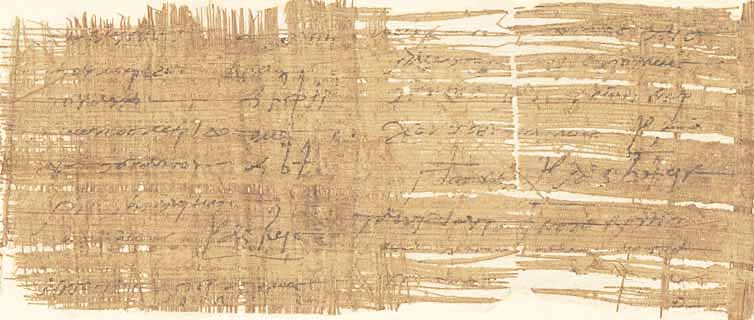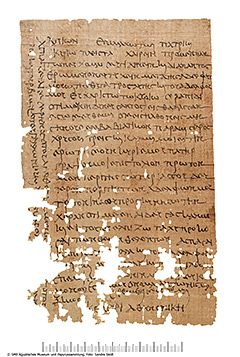BGU II 423 (P. 7950)
This letter from a soldier to his father is something very special. He was found in Egypt, but originally comes from Italy. Since there is no date in the text, it can only be dated on the basis of the paleography, which dates it to the 2nd century AD.
The papyrus leaf comes from the private collection of Berlin publisher and businessman Rudolf Mosse and came to the Berlin papyrus collection in 1894. It has writing on both sides and contains the letter on the front and the address on the back.
It is a letter of the soldier Apion to his father Epimachos in Philadelpheia in the Herakleidu Meris of the nome (district) Arsinoites in today’s Faijum. We learn that Apion was conscripted to the Roman fleet and served in Misenum in the Gulf of Naples. After arriving in Italy, he wrote his first letter to his father in the Arsinoites, which has survived in the arid climate of Egypt.
At this time Misenum was the port of the strongest Roman fleet. In addition to their military tasks, which consisted mainly in the protection of the sea routes, the marines also had a number of civilian tasks. For example, in Naples they had to provide sunshades to cover the colosseum. Apion reports in this letter that he has received 3 gold pieces, and at the end adds two important pieces of information for his father, namely the details of how he can be reached. As a Roman soldier, he has now also got a Latin name and is called Antonius Maximus. The ship on which he serves is called Athenonike. Although he had already sent both details through a certain Euktemon, he adds it here for safety’s sake and asks his father to use the Latin name if he answers.
In addition to the greetings that he sends to family members and friends, he also sends greetings from at least 4 other people, added to the left margin of the letter. Obviously Apion did not go abroad alone. He also asks his father for a letter and thanks him for the good education, which will hopefully helps him to make a rapid career. In addition, he briefly reports on his passage to Italy and mentions a danger on the sea, against which the god Serapis has protected him. Unfortunately, he gives no further details.
On the back of this letter is the already mentioned address. Actually, there are even two who were written upside down to each other. One names the recipient and the destination of the letter, Epimachus, the father Apion, in Philadelphia. The other is somewhat unusual: it shows that the letter should first go to a Iulianus, the writer is a military unit stationed in Alexandria. He should then forward the letter to Epimachos. It looks like, as if Apion has used the military post for his private letter, which was forbidden. But since we no longer know any further details about the writer Iulianus and the father Epimachus, we can only speculate why the use of the military post was possible despite the prohibition. Perhaps Iulianus was a former comrade of Epimachus, a veteran now living in Philadelphia.
Externally, this letter has some special features. The papyrus leaf had been folded several times after the inscription. This can still be seen in the regular breaks in the papyrus. In addition, however, this letter was apparently also tied, as the remains of the crosses on the back prove. These were drawn over the lacing to make it visible that the letter had been opened in the meantime.



